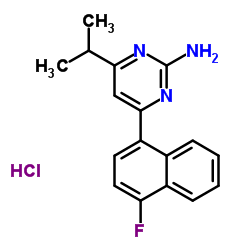199864-87-4
| Name | RS 127445 hydrochloride |
|---|---|
| Synonyms |
MT500
4-(4-Fluoro-1-naphthyl)-6-isopropylpyrimidin-2-amine hydrochloride (1:1) 2-Pyrimidinamine, 4-(4-fluoro-1-naphthalenyl)-6-(1-methylethyl)-, hydrochloride (1:1) 4-(4-Fluoro-1-naphthyl)-6-isopropyl-2-pyrimidinamine hydrochloride (1:1) RS-127445 hydrochloride 4-(4-Fluoro-1-naphthalenyl)-6-(1-methylethyl)-2-pyrimidinaminehydrochloride RS-127445 |
| Description | RS-127445 is a selective, high affinity, orally bioavailable 5-HT2B receptor antagonist with a pKi of 9.5. RS-127445 shows 1000 fold selectivity for this receptor as compared to numerous other receptor and ion channel binding sites[1]. |
|---|---|
| Related Catalog | |
| Target |
5-HT2B Receptor:9.5 nM (pKi) |
| In Vitro | RS-127445 is found to has nanomolar affinity for the 5-HT2B receptor (pKi=9.5±0.1) and 1,000 fold selectivity for this receptor as compared to numerous other receptor and ion channel binding sites. RS-127445 potently displaces [3H]-5-HT from human recombinant 5-HT2B receptors expressed in CHO-K1 cells. The affinity (pKi value) of RS-127445 for the 5-HT2B receptor is 9.5±0.1 (n=9). RS-127445 is selective for the 5-HT2B receptor, having approximately 1000 fold lower affinity for the human recombinant 5-HT2A, 5-HT2C, 5-HT5, 5-HT6 and 5-HT7 receptors, a 5-HT1A receptor in rat brain membranes, a 5-HT1B/D receptor in bovine caudate, and a monoamine uptake site in rabbit platelets. RS-127445 potently blocks the 5-HT (10 nM) evoked increases in intracellular calcium concentrations in the HEK-293 cells expressing the 5-HT2B receptor (pIC50 of 10.4±0.1). In cells expressing human recombinant 5-HT2B receptors, RS-127445 potently antagonizes 5-HT-evoked formation of inositol phosphates (pKB=9.5±0.1) and 5-HT-evoked increases in intracellular calcium (pIC10=10.4±0.1). RS-127445 also blocks 5-HT-evoked contraction of rat isolated stomach fundus (pA2B=9.5±1.1) and (±)α-methyl-5-HT-mediated relaxation of the rat jugular vein (pA2=9.9±0.3)[1]. |
| In Vivo | In rats, the fraction of RS-127445 that is bioavailable via the oral or intraperitoneal routes is 14 and 60% respectively. Intraperitoneal administration of RS-127445 (5 mg/kg) produced plasma concentrations predicted to fully saturate accessible 5-HT2B receptors for at least 4 h.RS-127445 (5 mg/kg) is administered to rats by oral, intraperitoneal and intravenous routes. Peak plasma concentrations are rapidly achieved with the highest concentrations being found at the first time-point measured following intravenous and intraperitonael administration (0.08 h) and by 0.25 h following dosing by the oral route of administration. RS-127445 is cleared from plasma with an estimated terminal elimination half-life of approximately 1.7 h. The bioavailability of RS-127445, when administered by the oral and intraperitoneal routes is approximately 14 and 62% of that obtained by intravenous administration. Approximately 60% of an intraperitoneal dose and 14% of the oral dose of RS-127445 (5 mg/kg) is bioavailable[1]. RS-127445 (1-30 mg/kg), dose-dependently reduces faecal output, reaching significance at 10 and 30 mg/kg (n=6-11). In blood and brain, >98% of RS-127445 is protein-bound[2]. |
| References |
| Density | 1.213g/cm3 |
|---|---|
| Boiling Point | 472.8ºC at 760 mmHg |
| Molecular Formula | C17H17ClFN3 |
| Molecular Weight | 317.788 |
| Flash Point | 239.8ºC |
| Exact Mass | 317.109497 |
| PSA | 51.80000 |
| LogP | 5.52470 |
| Vapour Pressure | 4.13E-09mmHg at 25°C |
| Index of Refraction | 1.637 |
| Storage condition | Desiccate at +4°C |
